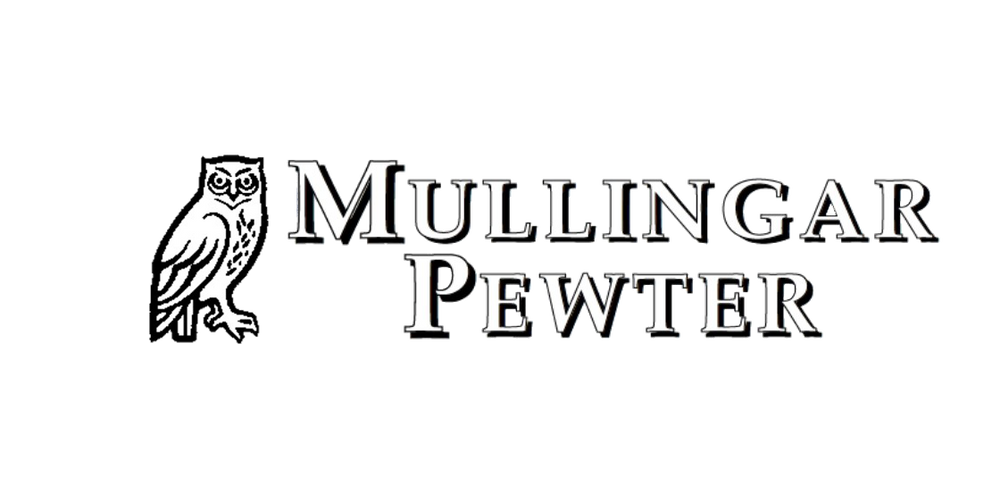Our Story
Mullingar Pewter
Mullingar Pewter – A Tradition of Craftsmanship & Sustainability
The ancient craft of pewter making was revived in Ireland by Paddy Collins in Mullingar in 1974. Today, his son, Peter Collins, continues the tradition, leading a skilled team of 30 local artisans. Our pewter pieces are still handcrafted using time-honored casting techniques, meticulous assembly, and delicate hand-finishing—skills that take years to perfect.
We take great pride in upholding the highest standards of design and quality, ensuring that each piece we create is both exquisite and enduring. Inspired by Ireland’s rich heritage, many of our designs draw from Celtic crosses, historic monuments, and traditional Irish motifs. Our collection includes both practical and decorative items, featuring Irish, Celtic, Kells, Woodland, Legend, Religious, and contemporary designs. Over time, our pewter pieces have become cherished collectibles, valued by enthusiasts worldwide.
Sustainability at Mullingar Pewter
Sustainability is at the core of our craftsmanship. Pewter itself is an eco-friendly material—it is durable, 100% recyclable, and designed to last for generations. Our production processes minimize waste, and all soldering for food and drink items is done with lead-free solder to ensure safety and quality. By employing traditional handcrafted techniques, we reduce our environmental footprint while supporting local artisans and preserving a centuries-old craft.
Our Product Range
We offer an extensive range of handcrafted Irish pewter gifts, including:
- Drinkware & Barware: Tankards, goblets, flutes, whiskey measures, hip flasks, and bottle openers
- Tableware & Serveware: Tea sets, coffee sets, trays, pitchers, candlesticks, cake servers, and cutlery
- Decor & Collectibles: Celtic crosses, plaques, statues, picture frames, and nativity sets
- Jewelry & Accessories: Bangles, scarf rings, tie pins, cufflinks, pocket watches, and keychains
- Traditional & Celtic Designs: Chess sets, Claddagh crosses, sports trophies, religious kits, and more
We proudly ship worldwide, bringing the finest Irish pewter to homes across the globe.
What is Pewter Made Of?
Originally, pewter was a mixture of lead and tin. Today, our pewter is made from 95% tin, with the remaining 5% composed of copper and antimony—completely lead-free and safe for use with food and drink.
Experience the beauty, heritage, and sustainability of Mullingar Pewter—crafted to be treasured for generations.
How to Clean Pewter
Pewter is a durable, low-maintenance metal that develops a beautiful patina over time. Whether you prefer a polished or antique look, proper care will keep your pewter looking its best.
General Cleaning (for all types of pewter)
- Wash by Hand: Use warm water, mild soap, and a soft cloth or sponge. Avoid abrasive cleaners or scouring pads.
- Rinse Thoroughly: Ensure all soap is removed to prevent residue buildup.
- Dry Immediately: Use a soft, lint-free cloth to dry and prevent water spots.
Polished Pewter (Shiny Finish)
- Over time, polished pewter may develop a dull appearance. To restore its shine:
- Use a pewter polish or a mix of vinegar and baking soda.
- Apply with a soft cloth using circular motions.
- Buff with a clean, dry cloth for a bright finish.
Antique or Oxidized Pewter (Matte or Dark Finish)
- Avoid polishing, as it can remove the darkened patina.
- Simply clean with mild soap and water, then dry thoroughly.
Removing Stubborn Stains
- For tougher stains, make a paste of baking soda and water, apply gently, then rinse and dry.
- For food or drink stains, a little bit of white vinegar on a cloth can help lift discoloration.
Additional Tips
- Avoid Dishwashers: The heat and harsh detergents can damage pewter.
- Keep Away from Direct Heat: Pewter has a low melting point and can warp if exposed to high temperatures.
- Store Properly: Keep pewter in a dry place, away from excessive humidity, to prevent tarnishing.
With proper care, pewter can last for generations while maintaining its timeless beauty!


The Rich History of Irish Pewter Craftsmanship
Irish Pewter has a proud tradition spanning over 800 years. Originating in the 12th century, pewter was once a luxury material reserved for the wealthy—gracing the grand tables of castles, merchant homes, and church halls. Early Irish pewter craftsmen created stunning handcrafted items like tankards, plates, and candlesticks.
As time went on, pewter became more accessible, appearing in taverns and homes across Ireland. Although the 18th and 19th centuries saw a decline in use with the rise of pottery and glassware, pewter has experienced a strong revival in recent years.
Today, pewter is not only appreciated for its timeless beauty but also for its practicality. It's a durable, low-maintenance metal that doesn't tarnish and makes an elegant statement for both everyday use and special occasions.
Unlike materials like zinc or brushed steel, pewter has a unique silver-like sheen that’s bright, warm, and welcoming. Its finish is distinctive and ideal for traditional Celtic designs. At Mullingar Pewter, we use a high-quality alloy made primarily from tin, a semi-precious metal, giving our pieces their signature lustre and enduring charm.

